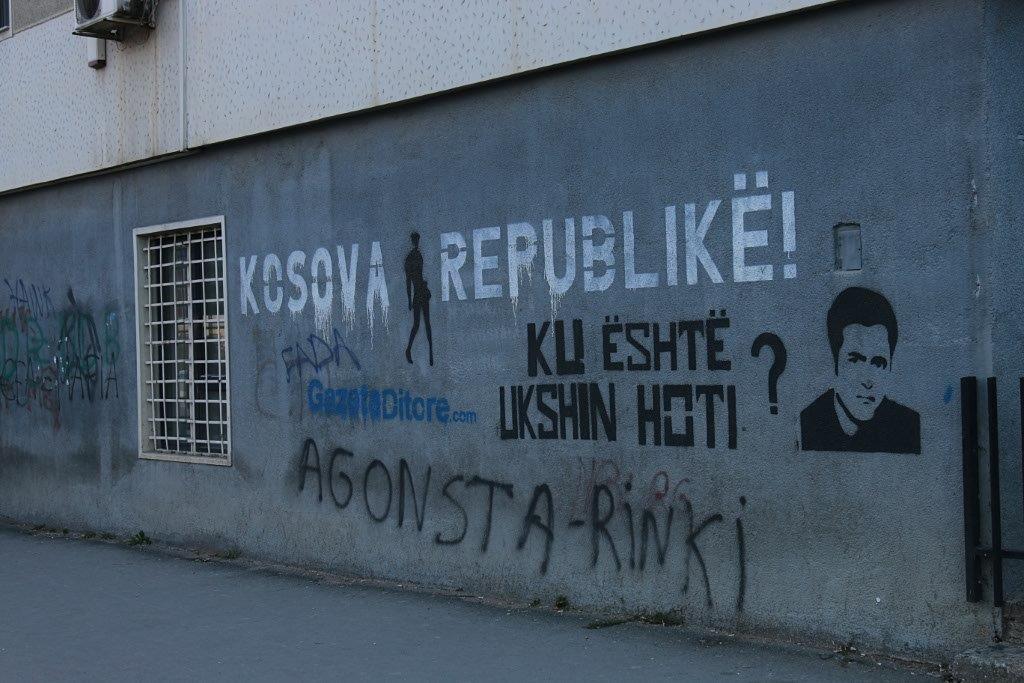
26 Feb 11: Bridge over troubled water (Kosovo & Serbia)
Bregovi, Serbia to Tran, Bulgaria (11 – 22 Oct)
Total miles cycled: 1,650 (2,655km)
Thigh status: Rubenesque
It is miserable and pouring with rain when I arrive in Mitrovica, Kosovo. My first impressions, noted in my diary, are alliteratively unequivocal – ‘grey, grotty, grisly, gloomy’ – with thick furrowed eyebrows etched over the two ‘o’s to iron out any ambiguity. I am clearly in a bad mood.
Keen to hunker down somewhere warm and dry, I enter the first motel I can find. This transpires to be a half-finished, oddly cavernous place with faint hints of The Shining, run by a gnome-like man with no neck. My room is large, but the bathroom is filthy and I force the man, in the absence of any staff, to clean it himself. If nobody complains then nothing will ever improve, I find myself thinking. Three months on the road and I’ve already turned into my mother.
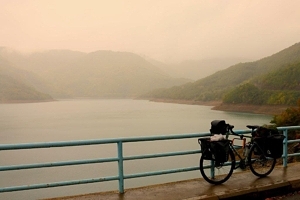
Rain hammering down en route to Kosovo. I am not a happy bummler.
The motel is located in the south of the city, linked to the north via a bridge over the Ibar river. The bridge is closed to traffic, blocked by broken slabs of concrete and a meagre patch of grass known euphemistically as the ‘Peace Park’. At first the significance of this is lost on me. I am aware the city is divided: ethnic Albanians in the south, Serbs in the north. But the nature and intensity of this partition only becomes apparent during a chat with a friendly Albanian waiter over dinner.
‘I’ve lived here for 15 years and only gone across the bridge twice, when my father got sick, as they have better doctors over there,’ he tells me. This is especially surprising because the restaurant is located right beside the bridge on the southern side and his brother works in the north for a Serb construction company. He insists he doesn’t have a personal problem with the Serb population, however. ‘It’s mainly Pristina and Belgrade that have the problem, not the people.’
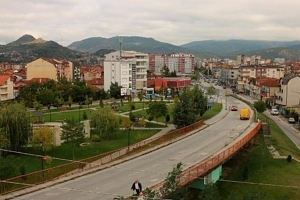
Mitrovica, south of the river.
After dinner I walk outside into a city gone wild. Albania has won 3-0 against Armenia in a UEFA Euro qualifiers match and everyone is celebrating. Car horns screech, fireworks blaze, crowds swarm and chant in the street. It’s primal, tribal, intoxicating in its intensity. What a powerful urge it is to be a cog in a big, baying machine, I think as I squeeze my way through the throng; that deep, primordial instinct to belong and exclude. It all seems harmless at this level. But when does this change? When does the game become reality and beeping horns morph into bombs and blocked bridges?
The next day I move to a cheaper, cleaner motel across the road run by a wiry man with a terrifying Adam’s apple and spend the afternoon chatting to people working for the European Union Rule of Law Mission (EULEX). The mission arrived in February 2008, operating under the UN to provide policing and legal support to the fledgling country. Not everyone is pleased to have them here – including members of government – seeing them as unwelcome and ineffective mediators between the state and Serbia. But without them Kosovo would arguably be in far worse shape.
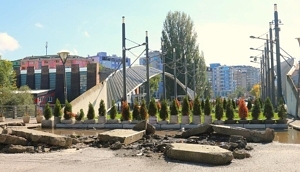
The rather measly ‘Peace Park’ on the bridge over the Ibar river, which divides the Albanian south from the Serb north.
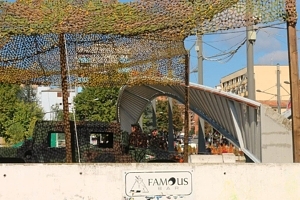
Soldiers protecting the bridge on the southern side.
‘The Kosovo government has really captured the state,’ a senior EULEX officer tells me over coffee. ‘It controls the media, money, privatisation, judicial system, everything. Rolling this back is very difficult.’
Meanwhile, everyone is leaving. Kosovans were the third largest national group seeking asylum in Germany after Syrians and Albanians in 2015, with nearly 40,000 requests. ‘At least there was vision under Yugoslavia,’ my contact says. ‘Now there is no vision – and for a lot of people, no hope. They are asking what tangible benefits independence has brought.’
Kosovo, which is 90% Albanian, unilaterally declared independence from Serbia in February 1998, prompting a brutal crackdown by Belgrade that ended with the intervention of Nato in 1999. Nearly two decades later, relations remain tense. Kosovo has now been recognised by 108 UN member states (56%), but Serbia still refuses to do so. Since April 2013, however, Belgrade has grudgingly accepted Pristina as a ‘legitimate governing authority’, maintaining control over only education and health.
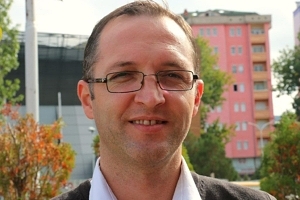
A friendly Albanian waiter, who tells me he has only crossed the bridge twice in 15 years.
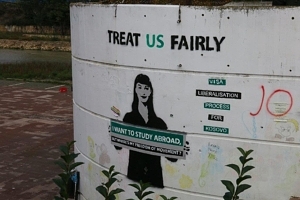
Graffiti in south Mitrovice.
Why is Serbia so keen to cling on, I ask? Isn’t it time to cut the cord? ‘There are lots of myths about Kosovo being a key part of its historic national identity,’ the officer tells me. ‘It also has substantial mineral wealth. And there’s the principle, of course, that unilateral declarations of independence are not acceptable.’ Most importantly, he adds, it’s a crucial negotiating tool. ‘They want to keep some leverage with the West. Especially when it comes to EU membership.’
It must be sad being Serbia, I reflect. Once a dominant drill sergeant with an iron fist and flock of pliant minions. Now, one by one they have all fled the coop, leaving it poor, humiliated and alone. It’s the tyrannical father whose kids finally work up the balls to abandon, bounding out to freedom while he screams obscenities and chases them with his battered Kalashnikov, before sinking into a bitter ball of inebriated senility and muttering phrases like ‘after all I did for them!’ and ‘they’ll be back, mark my words!’ from the folds of his baggy corduroy cardigan.
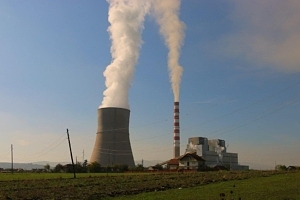
Power plant en route to Pristina from Mitrovice.
Later that night I walk to the north to meet my friend, another EULEX employee. Crossing the bridge feels like entering a new country. Here people speak Serbian, not Albanian, and use the dinar rather than the euro. Changing money isn’t a problem, however; you can do it easily on the black market with no bothersome police interference. In fact, you can do pretty much anything, within reason, according to my friend.
‘You’d be surprised what you can get away with. Changing money, driving without licence plates – nobody cares. The joke in Mitrovica is that you have to shoot three times for the police to turn up.’
It’s not a complete rule of law vacuum, he says. But it’s close. ‘If you’re looking for a terrorist recruitment region then it’s not a bad place to start. Cooperation between intelligence agencies is weak. Education is very shoddy, especially in rural areas. Religion is filling the void that communism filled before.’
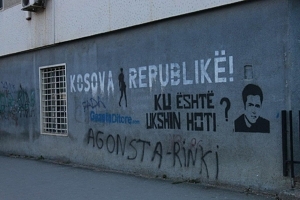
Graffiti in Pristina, the Kosovan capital. It reads: ‘Where is Ukshin Hoti?’ Hoti is a professor of law and philosophy, and a leading political activist, who disappeared in prison in 1999 after serving a five-year sentence for ‘endangering the public order of Serbia’. Many activists believe he was killed.
Yet there’s ‘lots of resilience against extremism’, he adds. Most people are moderate Muslims, who see no contradiction between their faith and drinking, smoking and sex. ‘It’s more about culture and tradition. The main religion is Albanianism, as ethnic belonging took over from religious during the decades spent fighting against Muslim Ottoman rule.’
The Berlin of the Balkans, Mitrovice is a vibrant but confusing place. Littered with NGOs and UN agencies, its unsettled identity is forged from conflict, chaos and international interference. Plans to open the bridge are constantly postponed, while tensions simmer unchecked. ‘It’s two very different cultures and languages,’ my friend says. ‘It’s difficult to see how the north could become fully integrated.’
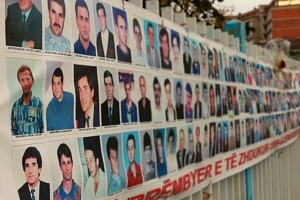
Poster in Pristina depicting the ‘kidnapped and missing’ during Serbia’s brutal crackdown on Kosovo in 1999.
Before leaving for Pristina, the capital, I meet someone working on the Anti-corruption Campaign for Northern Kosovo. Investigations are currently ongoing against two-thirds of the Kosovan parliament, she says. Many of these involve the tender process. ‘Someone will give a job to his brother’s company and not even be aware he’s doing something wrong. “It’s my brother,” he’ll cry. “He’s great!”’
The Balkan Investigative Reporting Network (BIRN) is doing its best to uncover some of the dodgy activity, but it’s not easy. Reporters work under difficult conditions, and are constantly pressured and harassed. One man was recently caught entering their office with a hand grenade, while another threatened to kidnap a reporter’s son. Meanwhile, those at the top remain untouchable. ‘We can report on mayors and ministers, but not the prime minister or president,’ the campaign officer tells me. ‘There are limits.’
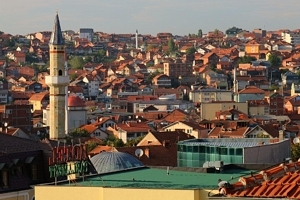
View of Pristina old town (what little remains) from my hosts’ balcony.
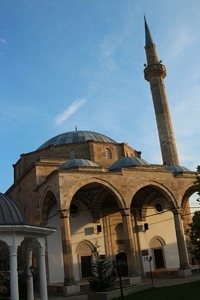
The Sultan Mehmet Fatih Mosque (or Imperial Mosque), built in 1460–1461 during the reign of the Ottoman Sultan Mehmet II.
After my friend leaves, I’m told my coffee has been paid for by the man at the next table. I assume it’s a come-on – Balkan men are feisty beasts when it comes to preying on weak, vulnerable fillies such as myself, I’m discovering – but it turns out it was his young son’s idea. ‘He overheard you’re a journalist and he likes journalists,’ the man tells me. Wow, I think. I wonder how long that will last?
This thoughtful little journophile is not the only Kosovan youngster I develop a soft spot for. Generally, I’m not a huge fan of kids, who I tend to view as a worryingly feckless bunch of miniature sociopaths. But dozens of them run and wave and shout cheery greetings as I cycle towards Pristina, and one even rescues my pannier after it flies off over a rogue speed-bump. During a rest stop by a school, I tell a teacher – the only person I meet who speaks English – how sweet they all seem. ‘Yes,’ she concedes. ‘They’re our best hope for the future.’ However, in many schools they are poisoned against the Serbs, she says. ‘For me there is no good nationality and bad nationality, just good people and bad people. But if you poison the children then what hope do we have?’
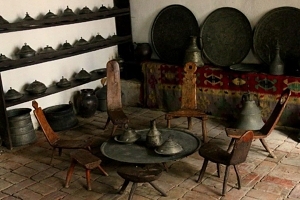
Interior of the charming Emin Gjiku museum, containing traditional tools, textiles, pottery, handicrafts, weaponry and the most ridiculously tiny chairs I’ve ever seen.
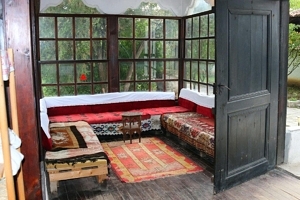
Main seating area in the Emin Gjiku house, which dates from the 18th century.
My first impression of Pristina is of an attractive, modern, functional place with few obvious signs of the precarious instability at its core. There are also few obvious signs of its rich history of Ottoman occupation, the city having fallen victim to the Communists’ ruthless modernisation drive. I spend an enjoyable afternoon visiting what remnants of its past remain, however – including four striking mosques, the Great Hammam (bathhouse) and the charming 18th century Emin Gjiku museum containing traditional tools, textiles, furniture, pottery, handicrafts and weaponry.
Overall, the city seems something of a muddle. A quick scoot around the centre reveals a clutter of old and new (or new and newer) buildings thrown together like clothes at a jumble sale. This is mainly due to historically lax enforcement of planning laws, I am told – as well as the fact that much of of the construction industry is controlled by the mafia, who use housing to launder their loot.
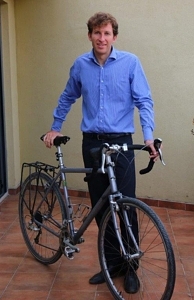
S, my very kind host, who – with his partner, V – is an avid cyclist in Kosovo’s mountainous terrain.
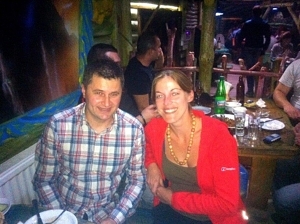
My new Serb friend, who I join for his 36th birthday in Vranje, Serbia. ‘Nobody laughs enough here,’ he tells me.
In Pristina, I meet a EULEX prosecutor for dinner near ‘small cafe street’ (roads are known by colloquial, descriptive names here), who tells me that organised crime remains a massive problem in Kosovo. ‘But rule of law is strengthening,’ he stresses. ‘Change is visible with the naked eye. You don’t need a microscope.’
The lawyer is a great fan of the Kosovan people, who he believes have ‘warm hearts and curious minds’. I find myself agreeing with him. Here, I’ve only encountered friendliness and goodwill, and I find myself reluctant to leave. But leave I must, and after just a couple of days of rest and recuperation with my lovely hosts – an American investigative journalist and Irish lawyer – I reluctantly hit the road again.
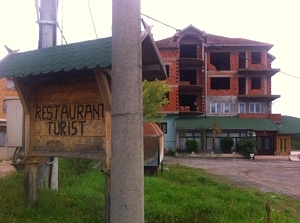
Another bustling tourist resort in the Serbian heartlands.
Over the next two days, I work my way across Kosovo and Serbia towards Bulgaria. Despite my intention to keep abreast of it, winter has now caught me in its spindly claws. Wind whips and blusters around me as I pedal up and down the hills towards Gjilan (dreary) and Vranje (marginally less dreary). The usual melee of half-built houses, hopeless mutts, semi-deranged livestock and dusty, ramshackle shopfronts line the road en route, and I find myself itching to reach the border.
In Vranje, I chicken out of camping as the temperature is outside my optimum range of 19-22C and instead check into by far the best budget hotel I’ve stayed at yet, boasting both clean sheets and a towel rail. To mark the occasion, I venture into town for dinner, where I am invited to join a chirpy Serb who is celebrating his 36th birthday with his brothers. He is originally from a small, east Kosovan village where Serbs and Albanians ‘live happily side by side’, and now works in a Vranje factory making heating equipment. He chats me up while showing me dozens of pictures of him and his friends feeding ducks in Geneva. ‘Serbia isn’t a good place to live,’ he says ruefully. ‘Everyone is sad. Nobody laughs enough.’
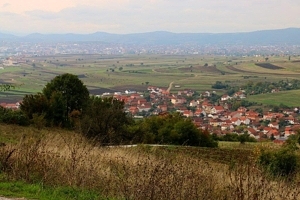
After Vranje, the sun comes out as the road weaves high into the hills. Beautiful.
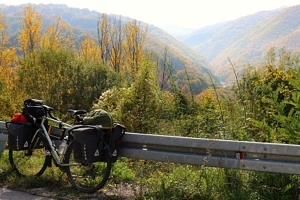
Pedalling through the mountains en route to the Bulgarian border.
The next day I set off on a tough schlepp towards Bulgaria, along a fat, single-lane road where lorries compete to send me hurtling into the afterlife. At about the halfway point, the road starts wending uphill, following the gentle contours of a stream deep into the mountains. For the next 30km I climb and climb, my skin tingling in the sweet autumnal air. The beauty of my surroundings is invigorating, and soon the cars and houses fall away and it’s just me, the road, the sun and the sky. Then, suddenly, I’m at the top, and off I swoop down down down through the thick, sunkissed forest, the cool breeze wrapping about me like a silk chemise.
At the bottom I hit the border – and I have to admit it’s a disappointment. I am expecting some glorious Ozymandias-style relic of gnarled, rusty decline; tangled coils of symbolic barb heralding empires’ inevitable decay. But no hint remains of the Iron Curtain now. Instead, I find just a normal, uninspiring checkpoint with a smattering of pleasant guards, who unsportingly let me through without a second glance.
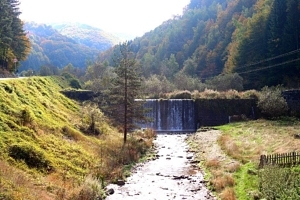
Pretty waterfalls near the Serbia-Bulgaria border.
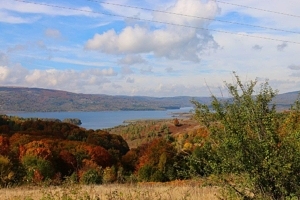
The Serbian countryside close to the Bulgarian border following a wonderful 16km descent from the hills.
About 18km later, after following a lovely, leafy road through the fields, I arrive in Tran. It suddenly dawns on me that I’ve hit my 12th country out of 20 and my last fully-fledged European state. I am excited to have made it this far, and feel obliged to crack open a bottle of excellent, earthy Domaine Pesthera 2011 in celebration. What’s in store for the remaining eight countries, I wonder? Will I make it through intact? Will Maud ever truly be tamed? Will I finally be blessed with the firm, shapely calves I’ve hankered after for so long?
As I squint with my mind’s eye, however, what lays beyond the horizon remains little more than a grey smudge; a misty morning sky yet to clear. I have absolutely no idea what’s in store. Except that it’s going to be an adventure. And begin with a god-awful hangover tomorrow morning.
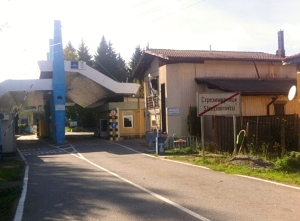
Border crossing where the old Iron Curtain used to be (Bulgarian side). Disappointingly uneventful.
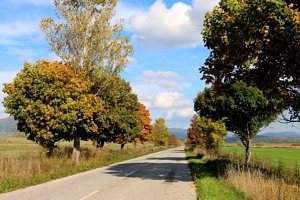
Lovely ride to Tran, Bulgaria, after crossing border from Serbia.
For more information and trip updates, please follow me on Twitter and Facebook.


Toby
Posted at 23:35h, 31 MarchVery absorbing, exquisite work. Keen to have you back to discuss belonging and its vile enabling shadow, exclusion. We also have new mutual neighbours to break in, something to look forward to. Forza, and with love! Tx
Bex
Posted at 19:13h, 12 AprilWhy thank you, kind sir! Looking forward to it. Please don’t go accumulating any new neighbour friends in my absence, however – you know their chard smoothies will never compare. Love & snogs to you & M x
Katalin Lowe
Posted at 12:28h, 01 AprilThis is beautifully written darling – quite poetic at times. You just seem to be getting better and better. You bring everything there to life. Nevertheless, I am worried sick about Sudan – it is silly to say ‘take care’, but there is nothing else I can do. I can hardly wait for June, although I shall miss the lovely blogs!
Bex
Posted at 19:23h, 12 AprilThanks mum. But don’t worry: Sudan (where I am as I write this) feels like one of the safest places so far. Except for the fiendish heat and lack of toilets. Luckily I am becoming more camel-like by the day (in appearance, at least) so hopefully all will be well xx
Andrew Mackay
Posted at 17:12h, 04 AprilI remember the Bulgarian border: 1977 – the Bulgarian Border police came into our Train compartment, 6 of them, in the middle of the night, shone torches in our faces, took our passports, shunted the train up and down a few times, got us really worried that we were going off without our documents, then returned them, all 6 men in the compartment once again, they’d stamped huge marks & signatures and separate date stamps upsidedown in our passports. Yes Bulgaria, Hmmmm. Communists.
Bex
Posted at 19:34h, 12 AprilPerhaps I should count myself lucky with the uninspiringly inoffensive crew I was faced with – but just a hint of barb or residual rancour would have been nice. I guess the grass is always greener…
Monkey
Posted at 03:11h, 06 MayAwesome you should think of sotmnhieg like that
http://www.paquetesislamargarita.com/
Posted at 01:34h, 13 MayThanks for commenting, Margaret. Can’t say I agree with your comment about women who are married not opting for MS; that has a host of baggage attached and speaks volumes about attitudes towards women who are unmarried etc. As I said to Kate, women having to declare their marital status for no discernible reason is a form of discrimination whichever way you look at it. I tend to correct it as I’d like to do away with the distinctions. Most people assume I am not married, (I don’t wear a ring) but I care not a jot about that.
Janine Pearce
Posted at 05:55h, 15 MayDear Rebecca,
Are things going ok for you? Are you going to blog again in June because there is not enough internet access? I have very much enjoyed your blog so far and look forward to reading of your adventures since May.
Wishing you all the very best of good fortune, safety and the goodness of people to be experienced,
Janine P
NZ
PS Although I don’t think you are coming this way, if you do come to this neck of the woods you are welcome to stay at our house for a few days to rest up!
reol8
Posted at 17:26h, 31 AugustDear Janine,
I am so sorry for the late response to your kind message – I’m afraid it completely passed me by until now. But thank you very much for your lovely message, which is now so badly out of date that any reply I give will be utterly pointless. My apologies! But I will be continuing to blog, despite now finishing my trip, in a bid to catch up with myself and make it to the bitter end, so plse watch this space. And if I ever swing by NZ (with Maud or without) then I’ll certainly swing by – and do look me up in London too. Thanks again! Rx
car insurance quotes
Posted at 01:30h, 16 MayConcordar, senora :)Io deja am rezervat 3 nopti in octombrie la Praga si zilele astea completez cu inca 2 la Viena, asa ca sa fie o sapt intreaga, cu drum cu tot.Sa avem ce povesti.
http://shttp.space/sberbank.ru
Posted at 02:30h, 31 AugustThis blog is very informative for me and I m very glad full for this blog owner. And I must say this to blog owner u make more this type blogs and we get more information about this. Thanks
reol8
Posted at 17:28h, 31 AugustHello! Thank you for your comment, it’s very good of you to write. As you’ve asked so nicely, I will certainly endeavour to write more as soon as possible. Really appreciate the support – Rx
EDV-Berater
Posted at 13:10h, 04 NovemberYour web-site is so nice. Thanks for sharing all these wonderful experience.